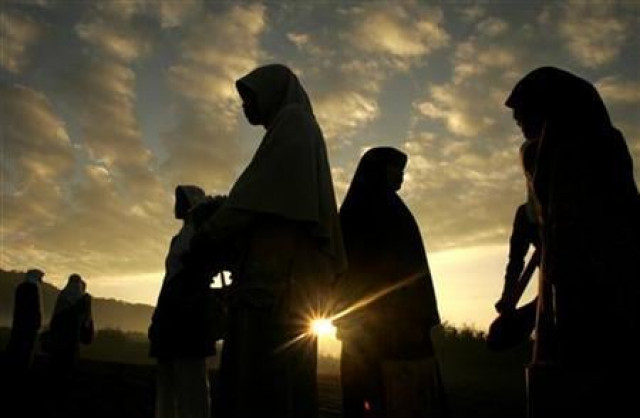Former ISIS brides say militants only want 'women and sex'
"What they want is only women and sex. It's disgusting," says Rahma, a former ISIS bride

n the scorching heat of the Syrian desert, dozens of runaway ISIS brides sit in a crowded concrete jail and wait with their children
PHOTO: REUTERS
Among these women is a French widow, a Syrian English teacher from Homs, and three Indonesian sisters. The teacher claims that she fell in love with a Moroccon militant when she was on her way to Turkey and was intercepted at Raqqa, while the three sisters insist they were lured into Raqqa, a place which ISIS proclaims as their caliphate, via a promise of providing them with free education and healthcare.
Lahore varsity professor, niece arrested in Karachi for 'Islamic State links'
Dozens of ISIS brides who have escaped the militants’ stronghold wait with their children inside a crowded jail in Syria, which is separated from the rest of the expanding refugee camp in Ain Issa, which is around 30 miles [50 km] north of ISIS' de facto capital, Raqqa.
Saida, originally from southern France, is among those runaway ISIS wives who fled when US-backed forces were closing in on the city. Many of these women claim to have paid smugglers to help them find their way to the outskirts of Raqqa, where they were escorted here by the Kurdish forces.
"The only thing I want is to go back, to take my car and travel back.” exclaims Saida, who is wearing a floral headscarf and is sitting with her 14-month-old son, whose face is covered with insect bites and is reflecting the struggles they went through as they were fleeing Raqqa on foot. Saida and her husband, a fighter named Yassine, had paid $6,000 to the smugglers to lead them out of the city. Yassine, however, died on the journey leaving Saida alone with their son.
Saida is amongst many other foreign women who migrated to the “Islamic caliphate” in hopes of starting a new life with strong, devout men. However, when they reached the place, reality was far removed from the imaginary solace that was portrayed to them; what they found instead was fighting in all female dorms, sex obsessed ISIS fighters, women divorced and remarried as many as six times.
The French woman recalls arriving in Raqqa, where she was shocked by the dormitory's rules and its relentless rounds of speed dating - a militant form of Tinder. She claims that recording information when they arrive is similar to making a CV, which both men and women have to fill in. They meet each other quickly and, if they both agree, they immediately get married.
Unlike those who arrived in Raqqa in hopes of finding love, May, the English teacher, coincidentally met the militant Bilal when she was staying at a friend’s home on her way to Turkey. "I think God sent him to me," she says, giggling.
Although she describes Bilal as being a pacifist, she adds that other women in Raqqa weren’t so fortunate. These women came in looking for strong European men in ISIS in hopes of getting their protection, but were appalled to find themselves divorced from them just after a few days or a month. She mentions one woman who married and divorced at least six times, until the judge in the caliphate's divorce court threatened her with being whipped or jailed.
May grieves on being separated from Bilal and expresses her desire to be killed if she would never meet him again. The three Indonesian sisters; Rahma, Fina, and Noor, however, have a different story as they claim they never actually wed ISIS fighters. After paying a huge sum of money to travel from Jakarta to Raqqa, they were welcomed with disappointment as they did not find the ISIS fighters to be the “pure Muslims” they were hoping they would be.
Head of Islamic State in Afghanistan killed
"They say they want to fight for the sake of Allah, but what they want is only about women and sex. It's disgusting," Rahma says, while Noor frowns deeply upon the fighting that take place in the all-female dorm. Highlighting the practices of shouting, gossiping, and backbiting that took place inside the dorm, she says, “The manner of the women inside the dorm is very different; it is very far from Islam,"
These sisters came to Raqqa in hopes of getting free medical treatment for Rahma’s cancer and for Fina to pursue computer studies, are now trying to get in touch with an Indonesian embassy to return home. It’s unclear, however, whether any of these women will ever make it out of Syria, let alone reach their homelands.
This story was originally published in CNN News.



















COMMENTS
Comments are moderated and generally will be posted if they are on-topic and not abusive.
For more information, please see our Comments FAQ